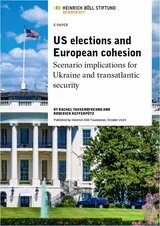What a show these last couple of weeks have been. The return of Donald Trump, the rupture of the German federal government, and then the ridicule of the Commissioner-designate hearings in the European Parliament. Challenges are rising, but stable majorities in Europe are eroding. It is increasingly difficult to build consensus and have a stable centre of political gravity.

The caretaker French government is teetering on the brink. The upcoming federal election in Germany means that Berlin will be busy with domestic affairs until summer 2025. The Dutch government nearly collapsed over antisemitism and islamophobia. Poland is already gearing up for its 2025 presidential election and new rogue political upstarts are emerging, such as the far-right presidential candidate in Romania. The political landscape is fracturing.
The European Parliament is particularly divided. From budget questions and the deforestation regulation to the election of von der Leyen and the Commission hearings, different majorities emerge on different issues. This does not increase stability – in fact, it hurts the authority of the European Parliament as an institution. This is the first time in 25 years that no European Commissioner-designate was replaced. Similarly, yesterday – with 370 votes – the European Commission was adopted with the lowest majority in its history. The divisions in the EP seem to be pushing it to the fringes.
In this political constellation, it’s Commission President von der Leyen who shoulders particular responsibility and has the potential for political leadership in Europe. It was her who smoothed the way for large parts of the democratic centre in the European Parliament to vote for her Commission, by changing portfolios and names of some Commissioners and disempowering one Executive Vice President.
It is also her, who is pro-actively looking to shape the transatlantic relationship under Trump. While some are recommending the EU quickly organise an EU-China Summit with Xi Jinping, an absurd proposition, she is already thinking of areas of EU-US cooperation be it with regards to economic security, increasing European defence efforts as well as more procurement of US LNG and weapons.
Time will tell, whether she will be able to steer the EU through this difficult environment. She will need strong EU Member States, such as a stable new German federal government, on her side.
In this context, I invite you to read our work on the US elections and what they mean for the European Union, save the date for our webinar on 12 December where we will discuss what Trump 2.0 means for Ukraine and transatlantic security, and check out the policy papers from our EU/North America Division in Berlin, that look into 6 specific policy fields and what EU reforms are necessary in order to make the EU enlargement-ready.
Read more in our Böll EU 9/2024 Newsletter!
Warm regards,
Roderick Kefferpütz, Director, Heinrich-Böll-Stiftung European Union


